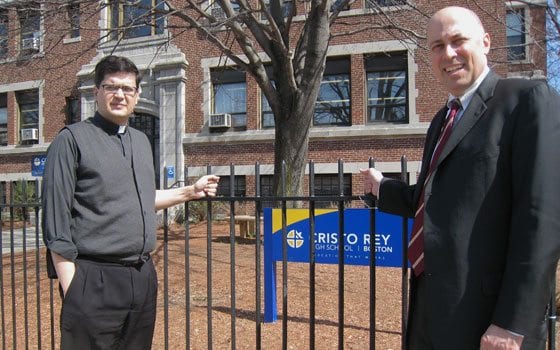

Margaret Turner, 77, lives in the small, neat Mattapan house she and her husband bought nearly 40 years ago. They set down roots and raised five children there. It’s been a good house, nice and solid; she plans to stay in it until her dying day.
A widow since 2004, and long retired from her job as a bank supervisor, Turner keeps an eagle eye on her expenses. She has her routine bills well in hand, but an unanticipated expense could spell trouble. So when water began dripping through her living room ceiling last year, she worried. When she noticed the water was dangerously near an electric light fixture, she sought help.
“I was concerned,” she said. “My roof was leaking, and I couldn’t afford to have it fixed.” She heard she might be eligible for help, given her age and fixed income. She first went to Action for Boston Community Development’s Mattapan Family Service Center.
“I told them about my situation,” she said, “and they gave me a flyer that connected me to the right people.”
The “right people” were at Rebuilding Together Boston (RTB), a nonprofit organization that has been quietly providing relief to homeowners like Turner since 1991.
“What we do is no-cost repair and renovation services,” said Simone Auster, executive director of RTB, an affiliate of the national organization Rebuilding Together. The aim is to help people who “for whatever reason” don’t have the funds to do much-needed repairs.
“Maybe they’ve been ill, so their funds have gone to medications,” she said. “Some are people who have become physically impaired, such as veterans and the elderly. Others are families with children who have to choose between putting food on the table or making major repairs.”
Before taking the reins at RTB in 2008, Auster’s roles in Boston included director of the Emerald Necklace Conservancy, general manager of South Station and vice president for community development at the Chamber of Commerce.
She said RTB has completed 270 projects in its two decades in Boston, at an estimated total value of $6 million. Volunteers do the repair work; Auster is the sole staff member. The organization is privately funded, relying on financial donations from foundations, corporations, individuals and associations along with donations of labor, supplies and equipment from contractors and vendors.
At Turner’s house, RTB’s workers didn’t stop after replacing her roof and gutters. They also installed metal grates in her steeply inclined driveway to stop rainwater from leaking into her basement. Inside, they repaired a bathtub drain and installed grab bars in the shower.
Getting help at no cost when she needed it was a piece of good fortune Turner still can scarcely believe.
“I’ve never gotten something for nothing in my life!” she marveled, standing in her driveway on a mild spring day pointing out the roof, gutters and new grates.
“And it was quick!” she added. After she submitted an application, including a letter describing her circumstances, everything was organized within three weeks, she said. The actual work was done in a few visits over a two-week period, and completed just before the first snow last November.
Though RTB does repairs year-round, a major portion of the organization’s work is done on its “National Rebuilding Day” every April. On that day, hundreds of volunteers gather at worksites, some of which are buildings owned by nonprofit organizations.
One beneficiary of last year’s Rebuilding Day was Cristo Rey Boston High School in Dorchester. As the school prepared to relocate last year to the former St. William School building in Savin Hill, there was much work to be done — and not much money to pay for it. On Rebuilding Day 2010, 140 volunteers came to the rescue.
At the school earlier this month, Father Jose Medina, Cristo Rey Boston’s principal, pointed out evidence of RTB’s work. Fresh paint brightens classrooms and hallways. Aging blackboards were pulled out and replaced with modern custom-cut whiteboards. Wood trim and cabinets were re-varnished. Outside, the graceful wrought iron fence that surrounds the school’s front yard was scraped and repainted.
All of this was done in one day.
Medina said they wondered how it would be possible to handle 100-plus volunteers converging on the school. “But [RTB] managed it and got it done,” he said. “They brought contractors to supervise. They had tools we didn’t have, like nail guns. When you have professional people — trained people — it works.”
All National Rebuilding Day projects are supervised by contractors and skilled laborers, but the rank-and-file volunteers could be anyone, according to Auster. “We accept anyone from total novice, to weekend warrior, to skilled labor,” she said.
Steve Sousa, a longtime RTB volunteer and former chair of the organization’s board, said much of the Rebuilding Day labor is done by groups from corporations, churches and youth organizations. For Sousa and for hundreds of volunteers he’s coordinated over the years, the work is intrinsically rewarding, he said — even though sometimes homeowners aren’t sure what to expect.
He recalled one homeowner who started out a little suspicious. “She wondered if she was going to be taken advantage of,” he said. “But at the end of the day, she gave us these hugs — and it just felt good, regardless of the blisters.”
This year’s Rebuilding Day is Saturday, April 30. More than 500 volunteers are signed up, Auster said. They will work at eight sites in Boston: four homes, three nonprofit organizations and the Dudley Square retail district, where RTB is participating in “Boston Shines,” the annual city-wide cleanup event scheduled for the same day.
For more information on volunteering with RTB or applying for repair help, call 617-971-0058 or see www.rtboston.org.






